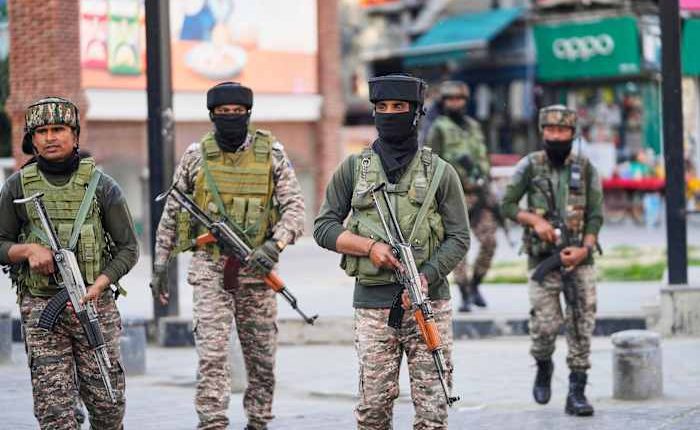Share this @internewscast.com

ISLAMABAD – Since gaining independence in 1947, India and Pakistan have engaged in three major wars. Additionally, they have experienced numerous smaller skirmishes and conflicts, including confrontations on a glacier recognized as the world’s coldest battlefield at the highest altitude.
The most recent tensions arose following a fatal attack on tourists, which India attributes to Pakistan — a claim Islamabad refutes. Unlike many other nations, their conflicts don’t follow typical wartime protocols.
The overarching influence is their nuclear weapon capabilities, which act as a unique deterrent against large-scale attacks and ensure that even when hostilities increase, they remain under control.
Here’s how — and why — Pakistan fight the way they do:
Their nuclear arsenals can destroy each other
“Pakistan and India have enough nuclear weapons to wipe the other side out several times over,” says security analyst Syed Mohammed Ali, who is based in Islamabad, the Pakistani capital. “Their nuclear weapons create a scenario for mutually assured destruction.”
Both countries have “deliberately developed” the size and range of their stockpile to remind the other about the guarantee of mutually assured destruction, he adds.
Neither country discloses their nuclear capabilities but each is thought to have between 170 and 180 warheads that are short-, long- and medium-range. Both countries have different delivery systems — ways of launching and propelling these weapons to their targets.
The arsenals are a defensive move to prevent and deter further fighting, because “neither side can afford to initiate such a war or hope to achieve anything from it,” Ali says.
It might not look this way to the outsider, but nuclear weapons are a reminder to the other side that they can’t take things too far.
Kashmir at the crux of the dispute
India and Pakistan have each laid claim to Kashmir since 1947, when both gained independence, and border skirmishes have created instability in the region for decades. Each country controls a part of Kashmir, which is divided by a heavily militarized border.
The two archrivals have also fought three wars over Kashmir, where armed insurgents resist Indian rule. Many Muslim Kashmiris support the rebels’ goal of uniting the territory, either under Pakistani governance or as an independent country.
Border flare-ups and militant attacks in India-controlled Kashmir have prompted New Delhi to take an increasingly tough position on Islamabad, accusing it of “terrorism.”
In the latest conflict, India punished Pakistan by hitting what it said were sites used by Pakistan-backed militants linked to a gun massacre last month.
A conventional military imbalance
India is one of the biggest defence spenders in the world, with $74.4 billion in 2025, according to the Military Balance report from the International Institute for Strategic Studies. It’s also one of the world’s largest arms importers.
Pakistan is no slouch, spending $10 billion last year, but it can never match India’s deep pockets. India also has more than double the number of active armed forces personnel than Pakistan does.
While India’s armed forces are traditionally focused on Pakistan, it has another nuclear neighbor to contend with, China, and it is increasingly concerned with maritime security in the Indian Ocean. Those are two factors that Pakistan doesn’t have to consider in its security paradigm.
Pakistan’s long and narrow shape, together with the outsized role of the military in foreign policy, makes it easier to move the armed forces around and prioritize defense.
A pattern of escalation and defusing
Neither Pakistan or India are in a hurry to announce their military moves against the other and, as seen in the current flare-up of hostilities, it can take a while for confirmation of strikes and retaliation to surface.
But both launch operations into territories and airspace controlled by the other. Sometimes these are intended to damage checkpoints, installations, or sites allegedly used by militants.
They are also aimed at embarrassing or provoking — forcing leaders to bow to public pressure and respond, with the potential for miscalculation.
Many of these activities originate along the Line of Control, which divides Kashmir between India and Pakistan. It’s largely inaccessible to the media and public, making it hard to independently verify claims of an attack or retaliation.
Such incidents raise international alarm, because both countries have nuclear capabilities, forcing attention back to India and Pakistan and, eventually, their competing claims over Kashmir.
The fear of nuclear war has put the two countries at the top of the agenda, competing with the papal conclave, U.S. President Donald Trump’s policies, and the Sean “Diddy” Combs trial in the news cycle.
No desire for conquest, influence or resources
Pakistan and India’s battles and skirmishes are away from the public eye.
Strikes and retaliation are late at night or early in the morning and, with the exception of the drone attacks on Thursday, they mostly take place away from densely populated urban centers. It shows that neither country has the desire to significantly harm the other’s population. Attacks are either described as surgical or limited.
Neither country is motivated by competition for resources. Pakistan has huge mineral wealth, but India isn’t interested in these and, while there are stark ideological differences between Hindu-majority India and Muslim-majority Pakistan, they don’t seek control or influence over the other.
Other than Kashmir, they have no interest in claiming the other’s territory or exercising dominance.
Copyright 2025 The Associated Press. All rights reserved. This material may not be published, broadcast, rewritten or redistributed without permission.

















